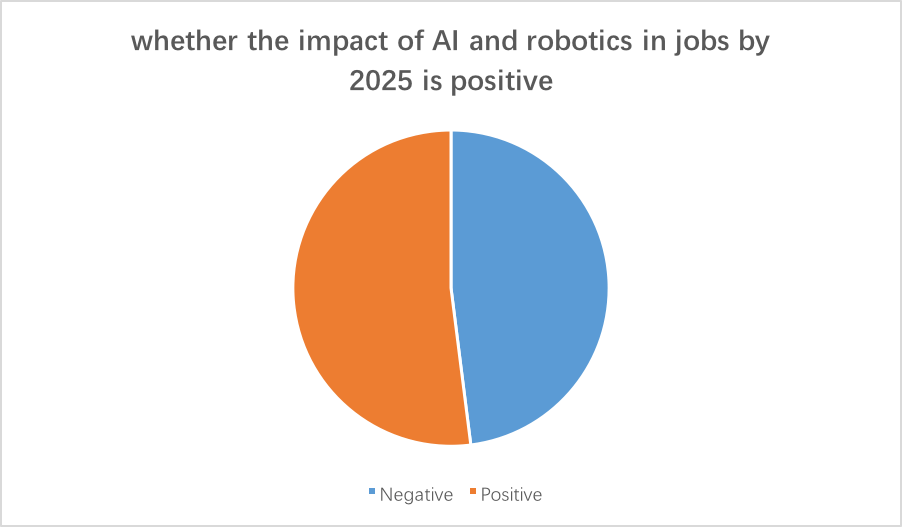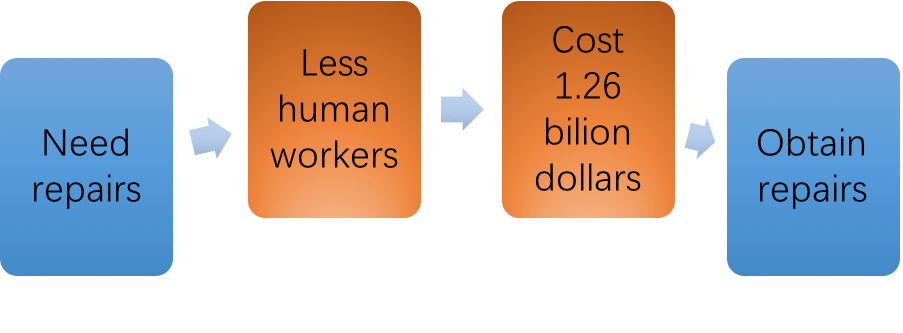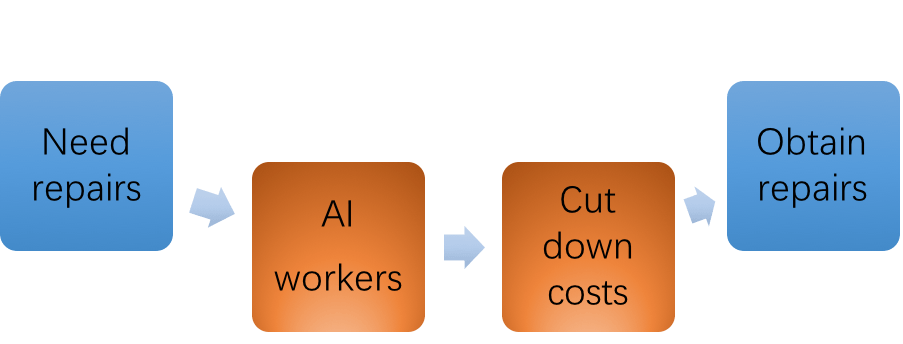In a survey with respect to Artificial Intelligence (AI), robotics, and the future of jobs, Arron Smith and Janna Anderson (2014) collected 1896 experts of technology’s responses and attempted to find out whether the impact of AI and robotics on jobs by 2025 will be negative or not.  The statistical findings were that about 48% of experts were concerned about the displacement of jobs by robots, and others stated confidently that AI will create more jobs than that it may destroy.
The statistical findings were that about 48% of experts were concerned about the displacement of jobs by robots, and others stated confidently that AI will create more jobs than that it may destroy.
In recent decades, robots with AI can finish some pre-defined works instead of human workers. Those robots possess the ability as much as workers. Some people start to worry about job losses and worse wealth inequality. Even some governments have posted anti-AI statements in public. For instance, after the meeting among some scientists who were against AI and President Obama, a federal report pointed out that “AI could threaten up to 47 percent of jobs among 702 occupations in two decades” (Berger, 2016). This indicates that if these threatened jobs result in job replacement, millions of Americans have to make a meager living and face challenging economic problems at least in a short term.
However, I found an interesting thing that existing workers are insufficient for the demand. In Stephen Moore’s report, America’s worker shortage: One million and counting, he asserted that one of the most serious problems of the U.S. economy for companies nowadays is finding workers when plenty of working-age people are out of the labor force. He wrote, “There are at least one million jobs that go begging day after day if only employers could find workers to fill them”. For example, U.S. Gulf Coast refiners plan to do repairs in 2017, but they are facing a great labor shortage; and it is difficult to find even the lowest-skilled workers. Next year, planned maintenance may cost 1.26 billion dollars, according to Industrial Information Resources (IIR), a department detecting labor supply for refiners and other industrial companies. It is no doubts that repairing is a huge cost. However, refiners have to spend even more money to interest and retain employees, and engage skilled workers from another area to finish works. Obviously, it is inefficient and expensive. Jarrett Renshaw (2017) pointed out that “That’s going to complicate scheduling and even extend outages, a vice president of IIR said”. Find more information from this link: https://www.reuters.com/article/us-usa-refineries-labor-analysis-idUSKBN14I0FA
 At this time, automatic systems and controlled robots can displace some of the skilled blue-collar workers, brings more labor supply and satisfies the demand of the industry. AI plays an important role in meeting the worker shortage by offering labors and cutting costs. What do you think? Do we really need to worry about the unemployment caused by AI?
At this time, automatic systems and controlled robots can displace some of the skilled blue-collar workers, brings more labor supply and satisfies the demand of the industry. AI plays an important role in meeting the worker shortage by offering labors and cutting costs. What do you think? Do we really need to worry about the unemployment caused by AI?

While reading this I have realized one important thing that AI will never be able to do. It cannot have feelings and creativity as humans do. We need creativity to improve daily and all of the technology that we have today has come from human creativity. AI won’t be able to invent something. It will only be able to perform tasks and create detailed diagnosis reports but it won’t have creative thinking which is essential when trying to find the best way to do work. AI will be used to improve and speed up less complicated tasks so people can focus and striving forward and using their creativity in pushing this world further. If AI does steal our jobs, I think that will be a really short time because then all the competitive spirit doesn’t exist anymore and then it just becomes boring. We have nothing to drive us to succeed except our own passion towards the job we want to work. This is all my opinion so I cannot put any links for reference
I support the shift to more AI jobs in society. The fear of being replaced by a robot can be daunting, but it is hard to beat a machine in efficiency. Businesses love efficiency and if they are given the choice between a robot they don’t have to pay and can work 24/7 at peak performance, and a human that has a salary and needs, they are going to choose the robot. I feel like the money corporations save doing this really helps boost business and the economy in general. I also read an article on how AI can coincide and create a better work environment.
Straying away from the job replacement side of AI, researchers have been studying the presence of AI in the workplace and having digital technology in the workplace can help boost productivity of the employees significantly, if applied correctly. Not only does AI make a workplace more efficient, it can help create more of a work-life balance for its employees. If employees have AI and a lot of useful digital technology at their fingertips on the job, they can get a lot more work done and can have time for their lives.
AI can automate a lot of things employees have to do which lightens their workload and also leaves them with more time for critical thinking and lets them work in a smarter work environment. AI replacing some jobs are going to be inevitable in this day and age, but we cannot always look at the bad side. We also must embrace all the good things this technology is helping us do.
http://saudigazette.com.sa/article/542175/TECHNOLOGY/AI-in-the-Workplace-can-boost-productivity
As AI technology increases at a rapid pace, we should be thinking about what happens to those who will be laid off and replaced by AI and automation. There will certainly be economic problems as people are not able to work or find jobs and therefore will not want to buy products. This could create problems in our largely consumer-based economy.
While I am personally a huge proponent of AI and other technologies, we need to take a look at our society’s structure and the effects that the rapidly expanding technologies will have. One key problem is the fact that higher education is already, and will become even more of a necessity for a large part of the population. The costs of college and other forms of higher education need to be addressed.
Attached is a great lecture video by Jordan Peterson, a professor of Psychology, who takes a look at the problems we may face as AI technology takes over jobs (starting at about 5 minutes he goes into these kinds of problems).
I think people do not need to worry about the AI too much, but we should make AI environment friendly.
Many people who concern about the threaten of A.I are reasonable. Their worry is the same as 80’ century that the born of cell phone. When the cell phone occurred, just few of people use them. Most people refused to use it because they were not familiar with it and worry about its advanced function. However, as you can see, cell phone is so popular in 21 centuries. Everyone has at least one cell phone on hand. People change their attitude dramatically towards the cell phone because they gradually enjoyed he pleasure and the convenience brought by the cell phone. Nowadays, we are facing the same situation as well. Therefore, I believe people will accept A.I eventually.
“Machine learning and artificial intelligence is extremely important and will revolutionize many vertical industries” John Giannandrea, Senior vice president of artificial intelligent (A.I) at Google. Like Ginnandra said, A.I will create a revolution of the technology development. Ai can bring lots of convenient in many fields. For instance, as the author said, A.I can help us to do those boring and repeatedly work and then improve the efficiency sand save time. For those jobs that require creative or complicated thinking will never be replaced by A.I.
Though A.I does not have that much threaten for human being, we still need create A.I friendly environment. We need law for A.I and build the order of A.I. With the technology goes forward, the A.I techniques will become more mature, At that time, we should have good preparation welcome the A.I era,
https://www.cnbc.com/2017/09/21/head-of-google-a-i-slams-fear-mongering-about-the-future-of-a-i.html
I agree with some other commenters here about the effects of AI on the workforce – while it’s likely that there will in fact be an upsurge in the number of unemployed workers as a result of AI being able to take over their jobs, AI is likely a positive development overall. Without having to worry about human error, and instead relying on computing, there is likely to be an upward trend in the efficiency of work being completed. When manufacturing becomes more efficient, it becomes cheaper and so do the goods being produced. Clothing, vehicles, technology, etc. all become more readily available to more consumers, driving societal focus off of material goods.
While reading this article, a question I had was about the implications about education. Is more education going to be necessary to enter additional workforce in more human-based issues such as social work or therapy, or will there simply be more people who can partake in manual labor jobs. This in itself creates another issue concerning selectivity – if there is a sudden influx of hundreds of people who need to find income, will the selection process for unskilled work go up? What happens to those who are not selected?
Although the debate about seems like it is one side or another (people will be losing their jobs or people will benefit from artificial intelligence) I feel that it is a little bit of both sides. I do believe people will lose jobs but I also believe that more jobs will be created. The people which artificial intelligence will affect most though are the people with a lower degree of education. The people who are not trained and educated enough to take the smarter and more advanced jobs created from artificial intelligence will suffer. People will not be able to work minimum wage jobs right out of high school because a lot of these lower paying jobs will be replaced by artificial intelligence and this will greatly affect this category of people.
An article by The Guardian suggests just the above. The lower and middle class jobs can be replaced but the more advanced jobs with a greater degree of intellect needed will be created. This will make our overall society more intelligent but also hurt those people who are not capable of doing these advanced tasks. It is a win-win for some sides but can be a lose-lose for the lower side.
https://www.theguardian.com/business/2017/aug/20/robots-are-not-destroying-jobs-but-they-are-hollow-out-the-middle-class
This is an age old question; will technology replace are jobs? We discussed this issue extensively in one of my economics classes and from that is where I’ve derived my opinions. Whenever new technologies are invented there is always a backlash from people who think they will lose their jobs. This happened in the automotive industry with the introduction of robots as well as in the sewing industry just to name a few. There are countless more examples of this but the end results are always the same.
People in those industries are worried that they will lose their jobs to the technology so there is a backlash. But due to its massive efficiency improvements the innovation persists. It is true that the people whose jobs where once sewing shirts are no longer sewing shirts, however they were not put out of work. The reason for this is because the jobs being done by the seamstress are in no way maximizing the human brain. That same person can be doing much more complicated jobs like accounting or finance or software development. Because of this the standard of living not only does not fall because of these new technologies but instead goes up. Now things can be done in a more efficient way and therefore making it available to more people. Cars get cheaper, Clothing gets cheaper.
I believe the same applies to AI. AI is simply new technology that will replace jobs done by humans and do them more efficiently. This will free up time for humans to do more complicated things that we are so good at.
One las note is that if AI were to get as capable as us in all ways then we may have a conversation then, but I think it’s safe to say we are far from that reality.
http://sites.bu.edu/tpri/2017/07/06/why-isnt-automation-creating-unemployment/